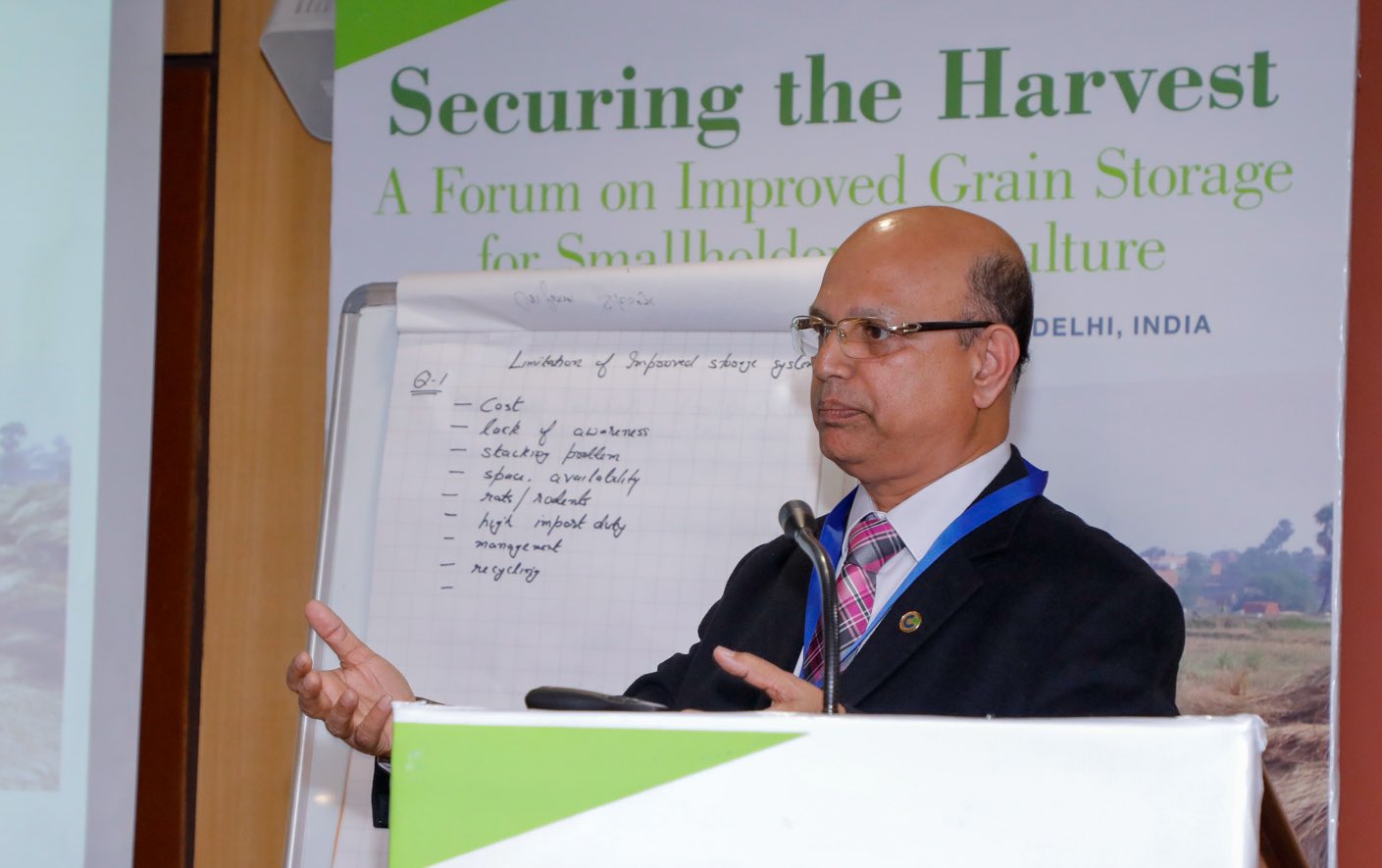Each year, about 1.3 billion tons of food produced for human consumption is lost after harvest and before reaching consumers around the world, according to the FAO. In India, postharvest losses amount to $13 billion.
A Feb. 5 forum in New Delhi, “Securing the Harvest: Improved Grain Storage for Smallholder Agriculture”—convened by the ADM Institute for the Prevention of Postharvest Loss and IFPRI-South Asia—brought together thought leaders, researchers, and practitioners from the public and private sectors to discuss ways to reduce these losses in India.
“If we can mitigate this loss, we can increase our food availability. It will also reduce the stress on the environment leading to less usage of water and pressure on the land,” said IFPRI South Asia Director Shahidur Rashid. But this is easier said than done. “We see that technologies seem to have a place in this battle against postharvest loss, but we recognize that there are a lot of steps between innovative technology and widespread usage,” ADMI Director Alex Winter-Nelson said. “We need to identify the unseen constraints.”
The forum was divided into four sessions in the form of keynotes, presentations, panel discussions and breakout groups that discussed the scope and scale of the postharvest loss problem; gave evidence on the effectiveness of improved storage in enhancing food safety and food security; discussed barriers to adoption and unintended consequences of improved storage systems; and suggested interventions to capitalize on the potential of improved storage.
“Better post-harvest loss management starts with better management of pre-harvest loss,” said T. Nanda Kumar, former Secretary to the Government of India. In the coming years, he noted, as the entire food industry and supply chain continue to modernize, food safety will increasingly drive the system. Farmers will be more likely to invest in a technologies that help reduce losses.
Kathy Baylis, a University of Illinois at Urbana-Champaign professor in agricultural and consumer economics, presented research showing that farmers tend to underestimate their own losses during harvest and storage. Evidence from a randomized controlled trial (RCT) in Bihar demonstrated the effectiveness of hermetic bags in reducing postharvest losses by 90%, enhancing food security and raising net revenues for smallholders.
However, as Pallavi Shukla, a postdoctoral fellow at Johns Hopkins University, noted, good technology does not necessarily lead to high rates of adoption; thus it is essential to provide a one-time subsidy to farmers to demonstrate the benefits of hermetic storage. In Bihar, multiple initiatives are underway to address these issues, including a 50% subsidy for farmers to purchase hermetic bags, said Anil Kumar Jha, Deputy Director of the Bihar Ministry of Agriculture. A presentation by Sarwar Mahmud, Director General of Bangladesh Ministry of Food, showcased off-farm, government-operated food storage methods as alternate methods of postharvest management.
The two panel discussions brought together private sector and industry leaders from the National Commodity and Derivatives Exchange (NCDEX), Confederation of Indian Industries (CII), and Roller Flour Millers Federation of India, who stressed the need to focus on the larger food system.
NCDEX CEO Vijay Kumar pointed out, “what makes sense to a farmer might not make sense to an entire supply chain. We need to focus on the supply chain efficiency so that everyone benefits.” Solutions proposed included working through aggregators such as Farmer Producer Organizations in order to achieve economies of scale, and Public Private Partnerships (PPP) as a viable model for public grain storage and distribution. There is also a need to bridge the gap of information asymmetry, as farmers do not fully understand the economic and health benefits of hermetic storage.
“Today everyone talks about nutritional security, which is a paradigm shift from food security. We need such a paradigm shift with postharvest management,” ICRIER Infosys Chair Professor for Agriculture Ashok Gulati said in his concluding remarks. “From a resource point of view, securing food loss might be much cheaper than producing extra food. However, we need more granular data to bring policy reforms on food losses.”
Maria Jones is an Associate Director and Sarah Schwartz is a Communications Coordinator with the ADM Institute for the Prevention of Postharvest Loss; Rebika Laishram is a Communications Specialist with IFPRI-South Asia in New Delhi.
The forum proceedings and presentations will be soon available on postharvestinstitute.illinois.edu.
The ADM Institute for the Prevention of Postharvest Loss was created in 2011 as a response to rising amounts of staple crops lost each year in food chains around the world. The Institute is hosted at the University of Illinois at Urbana-Champaign.







